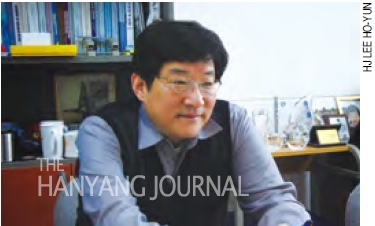
AMI, more commonly known as a heart attack, is an extremely difficult condition to treat, even more so when diagnosed late. “Considering how over half of heart attack patients die within the first hour, a faster, more accurate diagnostic method was in need,” said Professor Choo. Currently, one of the most commonly used methods of AMI diagnosis is Biosite’s Triage Cardio ProfilER, which measures each biomarker signal from a patient’s blood in 15 minutes. However, Professor Choo’s new method using nanobots takes the same amount of time to test two biomarkers, and boosts the biomarker signals by 10,000% making this revolutionary application twice as fast and 100 times more accurate compared to most commercialized methods.
Professor Choo and his team started their research in 2008. “The ERICA Campus has been focusing on bionano technology since early 2000. Over the years we accumulated the technology to analyze blood using nanotech and we searched for specific ways to apply the technology to the medical field,” Professor Choo said. After meeting with many doctors from various university hospitals, a proposal to focus on AMI diagnosis made by Korea University Hospital was chosen as their research subject. Through the cooperation of professionals from two different fields, they were successful in their research. “Working with doctors was sometimes challenging since the jargon we used during out discussions was at times new to both parties. However, once we more became accustomed to communicating with each other, the team achieved great synergy,” he said. Professor Choo believes the convergence of technology and medical science as being the root of their success. “To me, interdisciplinary studies are more than just merging two subjects. It is the interaction of two different areas of academia involving open minds working together to achieve common goals. Once that happened for us, the results were astonishing,” he said.
Along with his research, Professor Choo also created and became the head of the Department of Bionano Engineering in 2012 after spending 15 years at the Major in Applied Chemistry. “I encourage Hanyangians to show interest in things that are unfamiliar or seemingly unrelated to their main field of study. Exploring various fields of academia will be helpful in uncovering previously unknown potentials,” he said.
이 기사를 공유합니다

